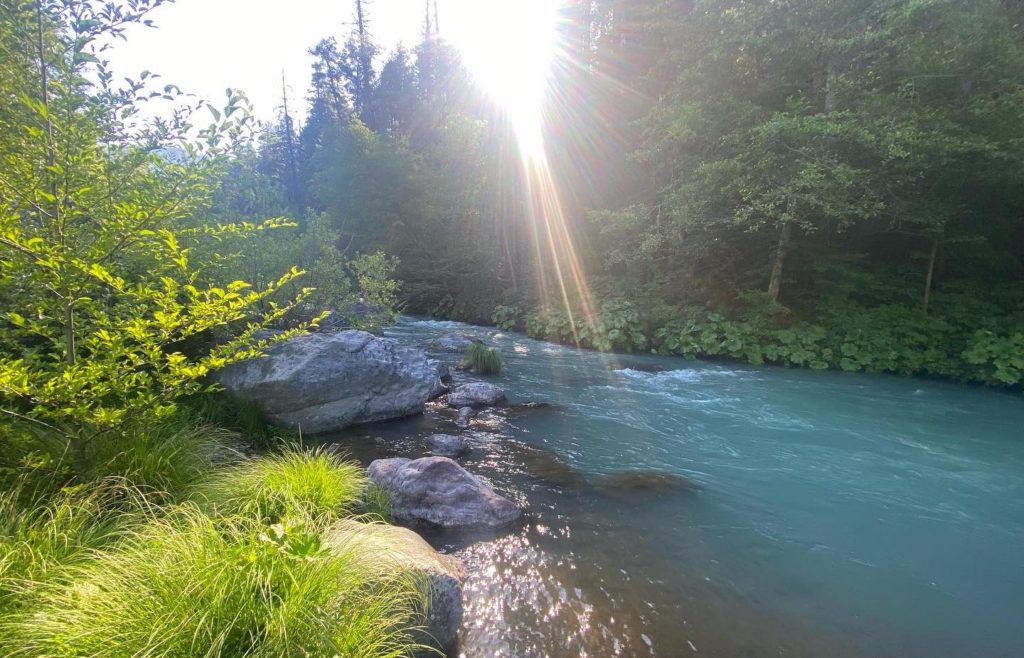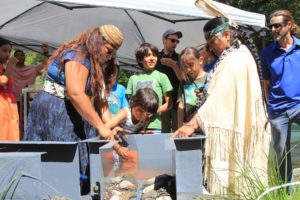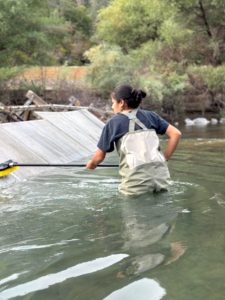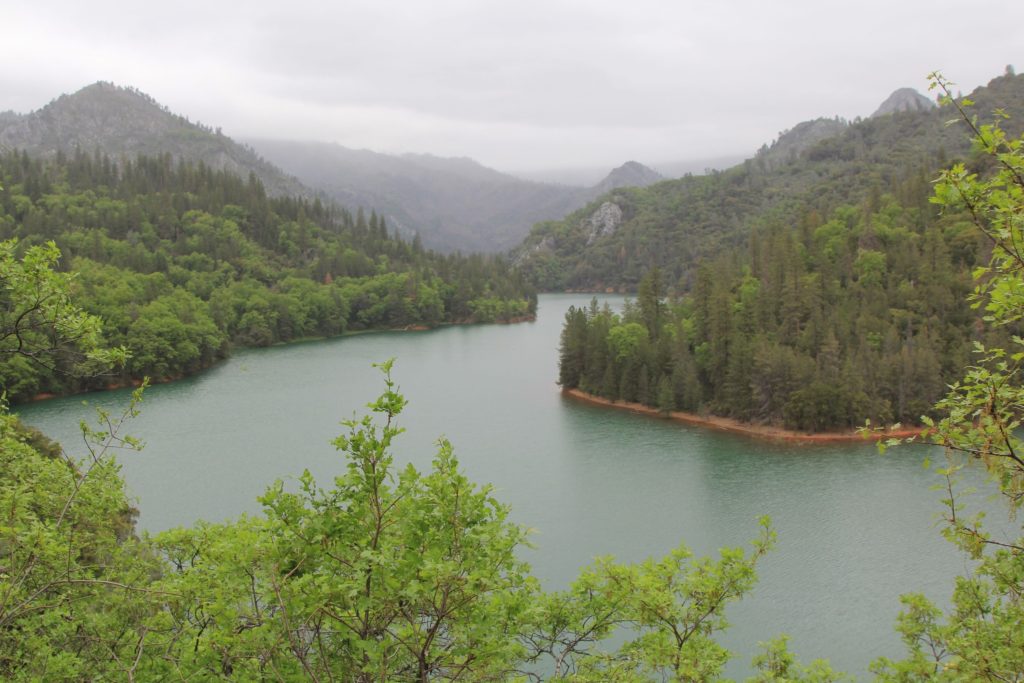
The Winnemem Wintu Tribe has had a busy year in 2023 reintroducing Winter Run Chinook to the Winnemem Waywaket (McCloud River). In May 2023, the Winnemem Wintu signed historic agreements with both the National Oceanic and Atmospheric Administration (NOAA) and California Department of Fish and Wildlife (CDFW) to become equal decision making partners in efforts to reintroduce winter run Chinook above Shasta Dam.
These actions are a part of our Tribe’s overall goal to return the Nur (salmon) to the Winnemem Waywaket. The pilot project with NOAA and CDFW includes reintroducing salmon eggs from hatcheries to the river, and our overall goal is to bring back our ancestral Nur who currently live in New Zealand.
We are grateful for the support of everyone who has prayed with us and stood with us over the years to bring the Nur back home. Here are some highlights of our year we would love to share with you, next steps in this monumental work, and ways to stay involved.
Employing Tribal Members as Cultural Resource Specialists
In 2023, through a grant with CDFW, the Winnemem Wintu Tribe was able to employ eleven Winnemem Wintu and neighboring tribal members to directly take care of the Nur eggs, tend to the land through habitat restoration, and participate in other cultural resource tasks like chopping firewood for elders. The Winnemem Wintu plan to continue employing Cultural Resource Specialists in 2024 and beyond.
Cassandra Curl, one of our Cultural Resource Specialists, shares: “The English language, in all its complexity, does not contain the appropriate words to express my deepest gratitude for this amazing opportunity to work and tend the Homelands of my Ancestors. I am grateful to quite literally walk in their footsteps.”

An Innovative “Nature-based Nur Incubation System”

In Summer 2023, Chief Sisk designed the Nature-based Nur Incubation System, a more natural incubation system for rearing salmon eggs. In this innovative system, the Nur can be in direct contact with rocks from the river and have space to swim when they hatch. We thank the UC Davis Fish Conservation Physiology Lab who lept into action to quickly construct the system and actualize Chief Sisk’s idea. The results of this first season are very encouraging, as the Nature-based Nur Incubation system helped produce salmon who appear to be resilient and strong swimmers. Tribes and agencies around the country are taking note of this innovative approach, and the Winnemem Wintu Tribe will be sharing more information as we continue to refine this incubation system.
Make sure to watch the video to see the Nature-based Nur Incubation System in action!
Tending to the Nur in the Winnemem Waywaket

Once the Nur eggs started hatching and entering the river, the Winnemem Wintu Tribe partnered with CDFW and Department of Water Resources (DWR) on two traps placed in the Winnemem Waywaket (McCloud River) to help move the Nur from the McCloud River to the Sacramento, so the Nur have a chance to swim all the way to the ocean. The Winnemem Wintu hold the belief that salmon must be wild and treated as wild in order to truly survive and thrive, and this means salmon must be handled as little as possible. The traps are a temporary measure to move salmon around the Shasta Dam until a volitional passage can be built. Our Cultural Resource Specialists handled the Nur lovingly and with respect to help them in their journey.
Fostering Partnerships

In addition to partnerships with NOAA, CDFW, DWR, and other agencies, the Winnemem Wintu Tribe is grateful for ongoing and new relationships with those with good hearts who are committed to supporting the return of the Nur.
We’re grateful to Tribal members who have danced and prayed for the Nur and the Run4Salmon community who have laid down prayers from the mountain to the ocean and back for eight years for the salmon to return.
We’re grateful for ongoing relationships with Maori elders and with Dr. Melanie Cheung, Maori biologist working on behalf of the Winnemem Wintu to support the rematriation of the Nur. We also thank New Zealand Fish and Game Commission for their cooperation and support.
We’re grateful to scientists from UC Davis led by Anne Todgham, Nann Fangue, and Dennis Cocherell, who have provided valuable support and consultation to the Tribe throughout the year.
We’re grateful to Daniel Cordalis, attorney and advocate, and Dave Hillemeier, fish biologist, for their support and advocacy for the Nur.
We’re grateful to John Ferguson, Elizabeth Greene, Michael MacWilliams and other team members at Anchor QEA, an environmental science and engineering consulting firm, who have agreed to provide extensive support to design the volitional passage for the salmon to swim to and from the ocean around the Shasta dam.
We are also grateful to Michelle Long and Don Shaffer of Jubilee Gift, who have provided valuable grant writing, administration, and fiscal support.

Next Steps
So what’s next for the Winnemem Wintu Tribe and bringing back the Nur? First and foremost, we are working urgently to bring the Nur back from New Zealand. We’re in discussion with state and federal agencies to find a pathway for Nur eggs to be brought home in a way that satisfies state and federal regulations and pathogen testing protocols.
The Winnemem Wintu Tribe will also be working with agencies and Anchor QEA to further research and designs for a volitional passage so the salmon can swim their journey from mountain to ocean and back as wild salmon.
We also look forward to catching “yearlings”, or Nur who have stayed in the Winnemem Waywaket (McCloud) for a year and will be stronger, faster fish to be moved into the Nomtipom (Sacramento River.)
Again, we give thanks to everyone who has supported this journey. While there is much work ahead, prayers are being answered for the Nur to return home!
Hii chala beskin,
The Winnemem Wintu Nur Restoration Team
